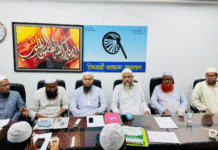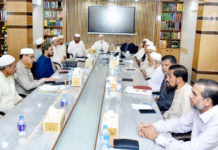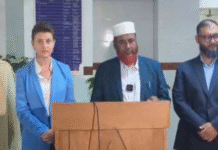Awami League general secretary Syed Ashraful Islam said a ban on Jamaat-e-Islami will come as a political decision.
“It’s a political decision. You will be informed when the decision is taken,” Ashraf said while talking to the reporters after placing wreath at the National Martyrs Memorial marking the 44th Independence and National Day on March 26.
Replying to a question on Jamaat issue, Information minister Hasanul Haque Inu said the ban on Jamaat depends upon the government, but all quarters of the country want that the party (Jamaat) should be banned immediately. “I hope the government will take decision in this regard soon,” he said.
Awami League joint general secretary Mahbub-ul-Alam Hanif on Thursday demanded that Bangladesh Jamaat-e-Islami be banned from politics.
“Jamaat is a party of war criminals. Time has come to ban the party… it’s time to ban Jamaat on the soil of Bangla,” he said while addressing a demonstration organised by Jubo League at Bangabandhu Avenue in the city.
The Awami League asked Pakistan to take the Jamaat leaders to the country if it considers them as its soldiers. “We’ll have no objection in this regard. But you (Pakistan) have no right to interfere in the internal affairs of an independent, sovereign country.”
Meanwhile, the investigation agency of International Crimes Tribunals (ICT) has sought ban on the Jamaat-e-Islami and its associate bodies, including its party newspaper Dainik Sangram, for committing crimes against humanity and atrocities during the 1971 Liberation War.
“The ICT’s investigation agency took eight months to complete its probe into the Jamaat-e-Islami and its associate bodies. It has submit the 373-page indictment report to the tribunal, seeking ban and confiscation of its assets and sources of finance,” according to investigating officer Md. Abdul Hannan Khan.
Leaders from all strata of the Jamaat and its allied organisations had been accused of committing seven categories of crimes from March 25, 1971 till December 16, 1971 throughout Bangladesh under Section 3 (2) of the International Crimes (Tribunals) Act, 1973.
The categories in which offences were made are: (a) Crimes against Humanity; (b) Genocide; (c) War Crimes; (d) Violation of humanitarian rules of the Geneva Conventions, 1949 which are applicable in any armed conflict; (e) Any other crimes under international law; (f) Attempt, abetment or conspiracy to commit any such crimes; (g) Complicity in or failure to prevent commission of any such crimes.
Besides Jamaat, the investigators also found involvement of the then students wing Islami Chhatra Sangha, Shanti Committee, its paramilitary groups Al-Badr, Al-Shams, Razakar Bahini, and party newspaper the Dainik Sangram in the above crimes.
War crimes investigators have recommended banning the Jamaat-e-Islami and six organisations that were associated with it back in 1971, as they have found the involvement of these anti-liberation bodies in grievous crimes committed during the Liberation War.
Officials of the war crimes probe agency also recommended confiscating the assets of these organisations.
Sanaul Haque, a senior member of the agency, referred to the Nuremberg trial in Germany, saying that Bangladesh is going to try a political party for war crimes. “It’s a historic moment.”
At the Nuremberg Tribunal, seven Nazi organisations, including the Reich Cabinet, Hitler’s paramilitary force Schutzstaffel (SS) and Gestapo, the secret police force, were tried for war crimes committed during World War II. Four of these organisations were convicted, and the Nazi party was banned.
About the Jamaat’s involvement in crimes, Sanaul said the party took a stance against the Liberation War, joined the Peace Committee and formed Razakar, Al-Badr and Al-Shams, the auxiliary forces of the Pakistan army, in line with its political decision.
Jamaat members, as per the decision, took part in numerous atrocities with the Pakistan army in 1971, he said, adding, “So, the Jamaat has to take superior responsibility for these crimes.”
About daily Sangram’s role, Sanaul said it published instructions and plans of the Jamaat high command and provocative speeches of its leaders that encouraged the party men to commit crimes.
“So, Sangram is also liable for these offences.”
The Pakistan army and its local collaborators killed some three million Bangalees, raped around a quarter million women and forced about 10 million Bangalees to take shelter in India during the nine-month war.
Hannan Khan, coordinator of the investigation agency, said they found the involvement of these organisations in crimes against humanity (murder, rape, extermination, deportation, abduction, torture and other inhumane acts), genocide and war crimes.
These organisations also abetted and conspired to commit such crimes and in many cases failed to prevent such crimes. These acts were in violation of the Geneva Convention of 1949, which is applicable in any armed conflict, he added.
During its investigation that started in August last year, the agency also looked into the Jamaat’s other activities since its birth to show that the party still believes in the same ideology, he said.
Earlier the High Court has declared the party’s registration with the Election Commission illegal, making it ineligible to take part in national elections. The matter is now pending with the Supreme Court.
Sanaul said the agency had cited 70 persons, including victims, war crimes researchers and historians, as witnesses and around 20 books, research papers and magazines and even documents of the Jamaat, to prove the charges.
Asked about the Islami Chhatra Shibir, the current student wing of the Jamaat, Sanaul said the organisation would have to face the same fate as the Jamaat if the prosecution could prove that it was the successor of the Islami Chhatra Sangha.
Established by the highly controversial Abul Ala Moududi in 1941, the Jamaat had been banned twice, in 1959 and 1964, for creating communal violence.
In independent Bangladesh, the party was banned immediately after liberation, but was later allowed by late president Ziaur Rahman regime to do politics.
The war crimes charges against the Jamaat come at a time when five of its top leaders have already been convicted of such crimes while four others, including its chief, are facing trial. One of the convicts was hanged in December last year.
Justice seekers and war crimes victims and their families have long been demanding the trial of the Jamaat as a party.
The demand gained momentum in February last year, when youths occupied the Shahbagh intersection in the capital calling for the highest punishment to be handed down to war criminals and a ban on the Jamaat and Shibir.
Following the protest, the government amended the International Crimes (Tribunals) Act, 1973, allowing the state to appeal against inadequate sentencing and paving the way for trials of organisations on charges of war crimes.
However, some legal experts said the Act had no provision for handing down punishment to any organisation and that the law should be amended again before the trial starts.
The investigation agency and the prosecution dismissed the view, saying the Jamaat could be punished for war crimes under the General Clauses Act.
Meanwhile, the Jamaat in a statement said it had no connection with the charges as mentioned by the ICT investitating team.
“The charges are false, fabricated and ill motivated,” said the statement issued by its acting Ameer Maqbul Ahmad and Acting Secretary General Shafiqul Islam.
The first war crimes tribunal of Bangladesh described Jamaat as a “criminal organisation” in its verdict sentencing its top war-time leader Ghulam Azam to 90 years in prison.
Delivering its verdict in the case against former Jamaat ameer Ghulam Azam, the International Crimes Tribunal-1 observed, “…Jamaat-e-Islami, as a political party under the leadership of accused Prof Ghulam Azam, intentionally functioned as a criminal organisation, especially during the War of Liberation of Bangladesh in 1971.”
Similar observations were made while handing down verdicts against other Jamaat leaders like Delwar Hossain Sayedee, Abdul Quader Molla and Muhammad Kamaruzzaman.
Source: Weekly Holiday









